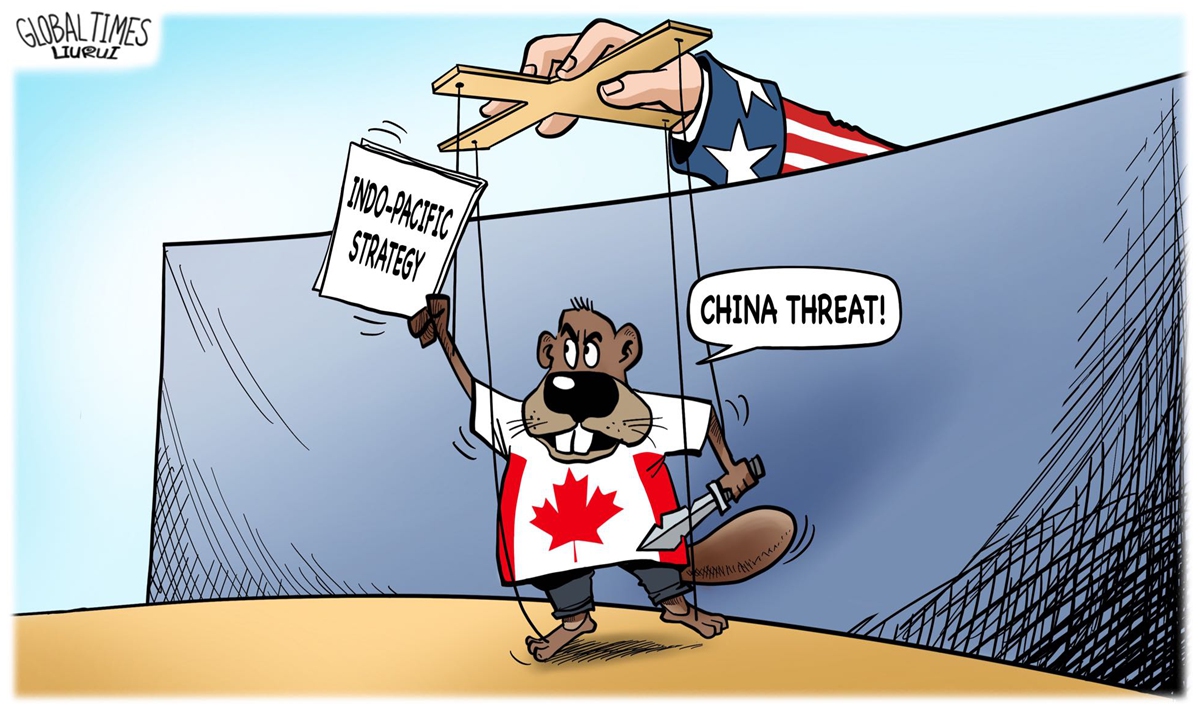
Illustration:Liu Rui/GT
The Canadian government released its so-called Indo-Pacific Strategy on November 27. The title itself is telling evidence that Canada is copying the US. After the US made up its "Indo-Pacific Strategy," it hoped its Anglo-Saxon brothers could keep up with it as soon as possible. Canada's pace is comparatively slow, which has resulted in Washington's impatience and dissatisfaction. Some US and Canadian media described the Canadian strategy as "long-awaited." Who was waiting for it? Why is it "long-awaited?" These questions are worth exploring.
For pragmatic and rational Canadians, there is nothing to look forward to in this document. The document not only harms Canada's interests, but also hurts the dignity of the country. It strengthens Canada's subordinate position to Washington in terms of diplomacy. The US ambassador to Canada David Cohen issued a statement saying "welcome" to the strategy immediately after its release, which aroused taunts from many netizens in Canada. In addition, some Canadians bluntly pointed out that Canada should not be a "cheerleader for Cold War 2.0," noting this "will not help Canada." These voices clearly indicate that what Canadians hope to see is a more independent strategy of foreign affairs.
For the Chinese people, this is a strategic document full of malice and prejudice. We must explicitly express our strong dissatisfaction of and firm opposition to Canada. If the 26-page document is checked for plagiarism, it can be found that it has many overlaps with published works bylined by "Washington," especially the part related to China. China has been mentioned more than 50 times and smeared as "an increasingly disruptive global power" on the world stage. The document's interpretation of China's domestic and foreign policies is completely wrong. It also imitates Washington's wanton tone on the Taiwan question and issues related to China's Xinjiang region, the Hong Kong SAR, and human rights, and brutally interferes in China's internal affairs. These words made Ottawa look deformed and weird.
Washington's attitude toward plagiarism in geopolitics is quite different from that in the academic field. It worries that no one will copy it, so it comes to the door to persuade or even force others to copy it. It uses this as a standard among its allies for reward or punishment. This is one country's "brainwashing" of another. After having served as Washington's little brothers for such a long time, these countries became very weak in the consciousness and ability to think independently. The contents that have catered to Washington and are full of ideological bias have made this report lose its value, thus becoming a cheap "political statement." In other words, it was primarily addressed to Washington. Canada, once again, played an ignominious role in US' destructive pursuit of hegemony and in its attempt to divide the world. If Ottawa's self-esteem when facing Washington were half as high as it is when facing China, it wouldn't have formulated such a national strategy that lacks both dignity and independence.
We also see the overconfidence of the Canadian government in this strategic document. Even the CBC report said the strategy was "using some surprisingly blunt language," saying the Canadian government needs to be "clear-eyed" about China's objectives in the Far East and elsewhere. The document promises to spend almost half a billion Canadian dollars over five years on improving military and intelligence cooperation with the Canadian allies in the region. These moves will have little effect in the Asia-Pacific region, which is the "highland of cooperation." Speaking of "clear-eyed," this is a great irony that reflects how deeply confused Ottawa's strategy is today. It really needs to wake up.
Canada's tuition fees will be high if it follows Washington's lead blindly. Even the US itself cannot "decouple" from China. That it has sacrificed the interests of its allies and incited its allies to "rush to the front line" to meet the US'own strategic needs has sounded alarms to some countries. China and Canada are thousands of miles apart, and there is neither major conflict of interests nor geopolitical conflict. China is a vast opportunity for Canada, but not a threat to it. If Canada still seeks to be a "middle power" with "world influence" and wishes to maintain its independent diplomatic tradition, it needs to look globally at today's trends rather than focusing on the narrow space of the "Indo-Pacific Club."
The voices of Canada were originally diverse, but are now becoming increasingly imbalanced, and Ottawa's radical attitude toward China is engulfing Ottawa. If the tough stance of this document is intended to give an answer to the pressure from the Conservative Party of Canada and Washington, it might turn out to be less harmful to Canada's actual interests. But if Canada really wants to use this to promote its policies in the Asia-Pacific region, it will be like the madness of riding a bicycle on the highway, where the slightest cut would be too costly for Canada to bear. If Canada really wants to reflect its value and sense of presence on the international stage, it should start, first things first, by getting rid of its strategic dependence on Washington.




